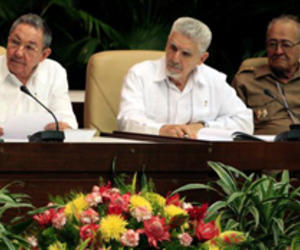Cuba approves economic changes at party summit
- Submitted by: manso
- Politics and Government
- 04 / 19 / 2011

(AP Photo/Ismael Francisco, Prensa Latina) Cuba's President Raul Castro, left, Cuba's Revolution commander Ramiro Valdes, center, and Cuba's Defense Minister Gen. Julio Casas Regueiro attend a 6th Congress of the Cuban Communist Party session in Havana, Cuba, Monday, April 18, 2011.
Tuesday, April 19, 2011. HAVANA. Cubans hoped to get details Tuesday of the sweeping economic changes and new leadership choices their government approved in closed-door meetings as the Communist Party held its last day of talks, to be concluded with a closing speech by President Raul Castro.
With Castro widely expected to take over from his brother Fidel as the party's first secretary, all eyes will be on the selection of his new No. 2, which could signal a possible favored successor.
Delegates approved about 300 economic proposals in a unanimous vote Monday _ including a measure that apparently recommends legalizing the buying and selling of private property.
Also on the table was a proposal to eventually eliminate the monthly ration book, which provides Cubans with a basic basket of heavily subsidized food and other goods. Other measures envision providing seed capital for would-be entrepreneurs and eliminating the island's unique dual-currency system.
"The economic policy (approved here) follows the principle that only socialism can preserve the victories of the revolution," said Marino Murillo, an ex-economy minister in charge of implementing the reforms.
Cubans were treated to a two-hour broadcast on state-run television late Monday of Communist Party committee members debating the finer details of the package of proposals, which have not yet been made public, although they are based on ideas that have been discussed extensively in recent months.
Delegates could be seen referencing subclauses by number and flipping through pages in front of them, as projectors juxtaposed close-ups of original and revised texts.
At one point, a committee discussing changes to agricultural laws voted on a small change in the wording of a sentence covering artificial insemination of livestock.
"We need to emphasize in the guideline that we should be aiding genetic development and artificial insemination," said one delegate.
"We are in agreement with the proposal," another committee member replied, before the discussion turned to ways to spur greater milk production.
The Party Congress does not have the power to enact the changes into law, but the suggestions are expected to be acted upon quickly by the National Assembly over the coming days and weeks.
Officials called the gathering to set a new course for Cuba's economy and rejuvenate an aging political class composed largely of octogenarians who led Cuba's 1959 revolution.
On Monday, an official photograph shot inside the spacious convention hall where the party congress was taking place showed Castro placing his vote inside a ballot box. "Candidacy for Members of the Central Committee," it read. A box that said "Vote for All" was checked on the ballot, indicating that Castro had approved an entire slate of candidates, though their names were not visible.
Fidel and Raul Castro have held the top two spots in the Communist Party since its creation in 1965. But at this year's Sixth Party Congress, there is an air of mystery surrounding the leadership vote.
In March, Fidel, 84, revealed that he had resigned as first secretary of the party when he ceded the presidency to Raul several years ago, although the party's website still lists him as its leader.
In a speech opening the Congress this weekend, Raul warned that a new generation is needed to take over when the old guard is gone.
He even proposed term limits for officials including the president. The goal is to create opportunities for younger politicians so they can gain experience, Raul said.
The speech intensified speculation the job might go to someone such as Lazaro Exposito, the young Communist Party chief in Santiago de Cuba, or Murillo, who has had a leading role in Congress.
Officials have emphasized that the changes are meant to "update" Cuba's economic model. State TV repeated Monday night that their objective is to "guarantee the continuity of socialism in Cuba." Associated Press writers Andrea Rodriguez and Peter Orsi contributed to this report.
Source: www.baynews9.com/article/news/ap/april/234741/Cuba-approves-economic-cha...
Comments